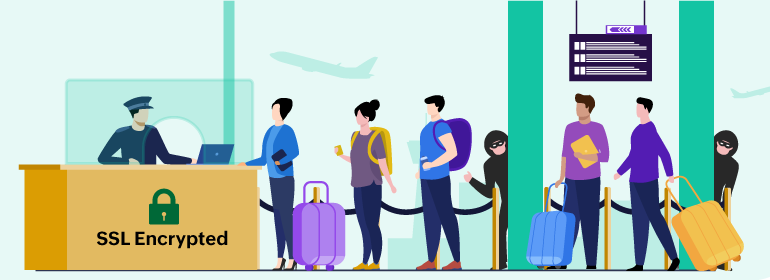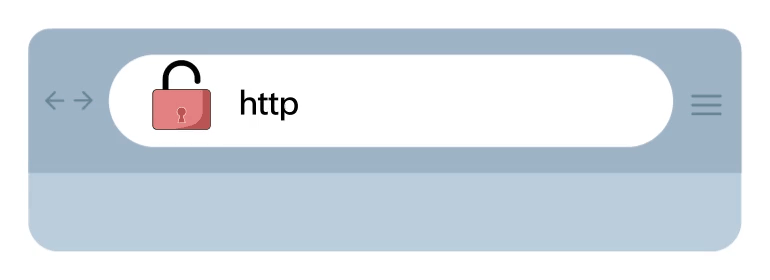All you need to know about SSL certificate expiration

With copious amounts of data getting added across online platforms, safeguarding data and ensuring a secure environment are concerns among business entities.
To offer a secure and reliable service, you need to identify loopholes, implement preventive measures to thwart attacks, and ensure customer data privacy. You need a valid Secure Sockets Layer (SSL) certificate to secure your online presence.
What is an SSL certificate?
SSL is a security protocol that creates an encrypted connection between the server and the client. The server can be a website or a protocol like HTTP, FTP, IMAP, or POP while the client can be a browser. SSL protects data available on online platforms by enabling the safe transfer of sensitive and confidential information, including passwords, credit- or debit-card-related information, personal details, and so on. The lock icon on a website, the green address bar, and the HTTPS at the beginning of a link are extended validation indicators that indicate the website is SSL or TLS secured.

A certificate authority (CA) will issue an SSL certificate to a website or a domain to certify that a trusted third party has verified the site's authenticity. A CA is a trusted authority that verifies the sites that are available online to ensure safe and transparent digital interaction.
To obtain a digital certificate for your site, you can raise a request to any CA with your distinguished name, public key, and signature. The CA will verify your signature using the public key and will verify your identity, after which you'll be provided with a digital certificate. This certificate is a data file containing the identity credentials of websites, people, or devices, and it acts as its online identity proof.
The digital certificate that enables identity authentication and ensures that the connection is encrypted is known as an SSL/TLS certificate. An SSL certificate includes three main entities—a public key, a private key, and the subject (which can be the name of the certificate or of the domain). The browser and the web server establish a connection through an SSL handshake by encrypting and decrypting public and private keys, thereby creating a session key to encrypt all the transmitted data. After the browser verifies the CA and the certificate, it assures the users that the website is safe.
Why do we need an SSL certificate?
SSL certificates help keep customer information safe, authenticate websites, and offer safe web transactions. Sites with an SSL certificate will have an encrypted HTTPS web connection.
So then why do SSL certificates expire?
For identification and reliability purposes, SSL certificates come with a shelf life. According to the CA/Browser forum, an SSL certificate should only be valid for a period of 13 months or 397 days.
Ensuring that the certificates are abiding by the latest security standards is also another reason for having a validity period. Domains are often sold and transferred, so a former owner having a valid SSL certificate can be risky. Moreover, the longer an SSL certificate is used, the chances of it being duplicated can be high. We know that SSL certificates expire no matter what, so let's see what happens when they expire.
What happens when an SSL certificate expires?
Let's say your SSL certificate expired just two days ago, so can't you use it at least for a week? You can, at your own risk, as with anything that has a limited shelf life.
Once the certificate expires, the transactions on the website will not be secure. The data will be transferred as plain text, and anyone who listens to the network can get access to the data being transferred. Moreover, hackers might try to create fake websites identical to yours.
A "Your connection is not safe" error message on your website will leave the impression that you're not careful enough to renew your certificate or abide by the latest security practices. This can have grave impacts on your customers' trust as well as on your brand reputation. It can even leave your customers' information exposed to potential hackers.
How to avoid unexpected SSL certificate expirations
Managing a website can be tricky–from getting hosted websites and SSL certifications renewed to domain renewal. Globally, there are more than 370 million domains and 46 million websites that use SSL. Adding to this, almost 65% of the website owners are concerned about cyberattacks resulting from expired SSL certificates.
Renewing your certificates is a simple process, but manually tracking the expiration dates of each of your sites can be time consuming and cumbersome. This is why you need a tool that can remind you about upcoming SSL certificate expirations, so you can renew the certificate in time.
A monitoring tool like Site24x7 can help you monitor the expiration and validity of your SSL/TLS certificates, identify any certificate revocation, run an SHA-1 fingerprint check to detect certificate tampering, identify any blocklisted CA, and get notified when certificates expire.
Here's to securing your sites with a valid SSL certificate and offering a secure platform for your customers.
Could you please look at enhancing certificate monitoring. We have noticed that it takes some time for certificate monitors to update.
1) We suspect that polling of the certificate expiry only happens once a day. If a certificate is updated it appears to take a few days to show the correct new expiry date. Sometimes forcing a poll (or more) will show the correct information
2) if the website down at the time the certificate monitor is polled it will show the SSL certificate monitor as down.
Is there any way to improve this behavior as it incorrectly shows up to date certificate ?
It'd be nice if S24x7 can also monitor ALL internal certs. For example, scan the servers certificate store and then let the user choose which certs to monitor.
Yes, checking of internal/on-prem self-signed certificates is also very important for us.
Hope you can bring this feature soon.
Regards,
Torsten
MOUY s.s.L. security license™ has expired unbestknownst to be and now a |33+ |-|4C|<3R has stolen my Identity.